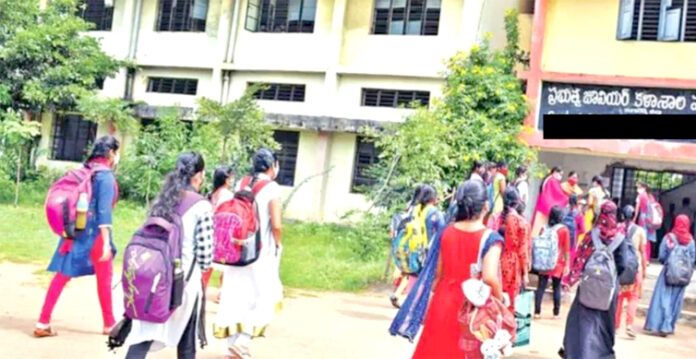Telangana State’s government junior colleges (GJCs) have experienced a notable decline in student admissions for the 2024-25 academic year. With a total of 1.75 lakh seats available across 423 GJCs, only 80,000 students have enrolled, marking a decrease of approximately 5,000 from the previous year.
This decline is expected to continue, particularly as the option for students to transfer to government residential junior colleges (GJCs) has yet to be implemented. This exit option allows students to leave GJCs for welfare residential junior colleges if they secure admission elsewhere.
Last year, GJCs saw 84,967 students enroll in the first-year Intermediate streams, with only 69,953 appearing for the Intermediate public examinations. This trend suggests a further drop in both admissions and exam registrations. Officials are forecasting a potential decrease of at least 10,000 students by the end of the admissions period on August 20. Several factors contribute to this decline.
Also Read: New Minority School and Junior College Set to Launch in Karwan
A primary concern is the inadequate infrastructure and shortage of lecturers in GJCs. The Department of Intermediate Education reports 1,724 vacant junior lecturer positions, with 1,598 of these positions previously advertised by the former BRS government but still unfilled. This shortage has resulted in lower-quality education compared to private and corporate junior colleges.
The GJCs recorded a pass percentage of only 38.21% in the first-year Intermediate Public Examinations (IPE) for 2024. Additionally, there is a pressing need for new buildings for 18 old GJCs. The expansion of government residential and corporate junior colleges in the state has further impacted GJC admissions.
Government residential junior colleges offer free education and coaching for competitive exams like JEE, NEET, and TG EAPCET, making them an attractive alternative to GJCs. Corporate junior colleges have also employed the PRO system to admit students even before Class X results are announced.
Most students who typically join GJCs come from government schools. However, with the establishment of welfare residential junior colleges providing quality education, these institutions are increasingly preferred over GJCs. Additionally, the recent regularization of contract junior lecturers in GJCs has contributed to the decline.
Previously, contract staff were motivated to campaign for admissions as their contract renewals were linked to student enrollment numbers. With contracts now regularized, staff have shown less interest in promoting admissions. Further, the lack of coaching classes for competitive exams and staff transfers have also affected admissions, sources say.
(This story is sourced from a third-party syndicated feed. Raavi Media takes no responsibility or liability of any nature. Raavi Media management/ythisnews.com can alter or delete the content without notice for any reason.)


